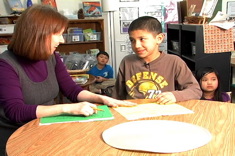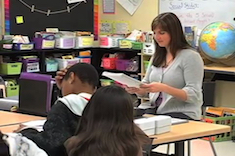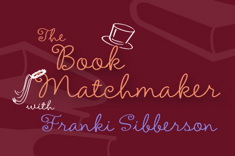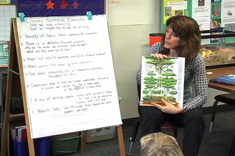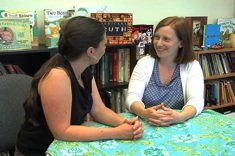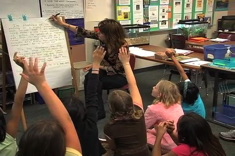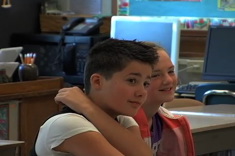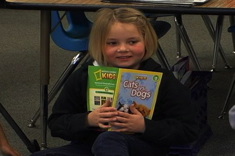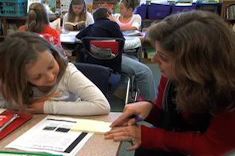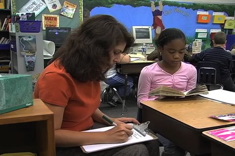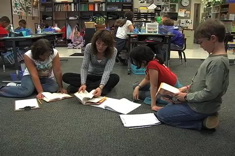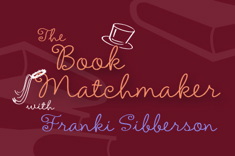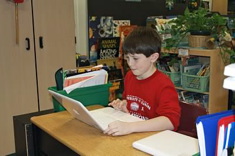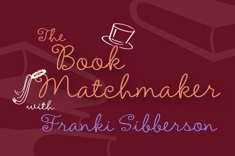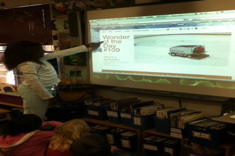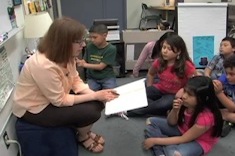4th
Latest Content
Stuck on a Thesis: Conferring
In this conference with a 4th grader, Beth Lawson works with a student who has chosen a challenging essay topic and is struggling to develop his thesis.
From “I Don’t Get It” to “Never Mind — That’s Amazing!”: Scaffolding Schema for Comprehending Poetry
Katie Doherty finds poetry is a powerful tool for helping her middle school students understand the value of schema while reading.
Book Matchmaker: Teaching Theme in the Intermediate Grades
Students need strong mentor texts for understanding the concept of theme. Franki Sibberson shares many of her favorites in this Book Matchmaker.
Why Read? – A Question to End the School Year
“Why read?” This is the question asked every spring in Erin Ocon’s middle school classroom, and in the process of answering it, she and her students rediscover a lot of what they’ve learned together throughout the year.
On Their Own (Almost): Coaching and Classroom Demonstrations Mid-Year
In this video filmed in mid-January, Jennifer Allen observes new teacher Jessica, and explains how she struggles to redefine her role in the classroom.
Digging Into Literary Nonfiction
Andrea Smith and her 4th grade students use an article from National Geographic for Kids to chart literary nonfiction elements.
Mentor Texts for Nonfiction Writing
Beth Lawson and Heather Rader meet to plan and share mentor texts for nonfiction writing in Beth’s fourth-grade classroom.
Frogs as Learning Ambassadors Part 2: Literary Nonfiction in 4th Grade
Andrea Smith explains how the classroom environment influences instruction in the second installment of this video series.
Scaring Up Better Narratives Part I
Just before Halloween, Aimee Buckner leads a lesson on brainstorming topics in writer's notebooks using the mentor text Some Things Are Scary. In this first installment of a three-part series, Aimee reads the book and models her own thinking process and use of a writer's notebook.
Previewing Nonfiction
Teachers are adding more nonfiction to their classroom libraries, and looking for ways to promote nonfiction with students in light of the emphasis on nonfiction in the Common Core. Franki Sibberson share tips for previewing nonfiction with students.
The Sponge Summary Lesson Part 1
In this sequence of videos, Heather teaches a fourth-grade class, using the analogy of a sponge to explain how summaries work. In this first video excerpt, Heather reviews the work the class has already done on understanding the attributes of good summaries.
Scaring Up Better Narratives Part 2
Just in time for Halloween, Aimee Buckner leads a lesson on brainstorming topics in writer's notebooks using the mentor text Some Things Are Scary. In this second installment of a three-part series, Aimee continues to confer with students and helps everyone refine potential writing topics in their notebooks.
The Sponge Summary Lesson Part 2
In this sequence of videos, Heather teaches a fourth-grade class, using the analogy of a sponge to explain how summaries work. In this second video, Heather presents the powerful analogy of a sponge for summarizing.
Scaring Up Better Narratives Part 3
Aimee Buckner leads a lesson on brainstorming topics in writer's notebooks using the mentor text Some Things Are Scary. In this final installment of a three-part series, Aimee continues to confer with students and shares a great tip for nonfiction research.
The Sponge Summary Lesson Part 3
In this sequence of videos, Heather teaches a 4th grade class, using the analogy of a sponge to explain how summaries work. In this third video, Heather and students cull down a text into the important points needed for a summary.
Main Ideas, Summaries, and Notes in a Reading Conference
In this conference with a fourth grader, Aimee Buckner tackles text choice, notes, and main ideas all in less than five minutes. You’ll notice teachers observing in the background; the conference is part of a demonstration lesson sequence.
The Sponge Summary Lesson Part 4
In this sequence of videos, Heather Rader teaches a 4th grade class, using the analogy of a sponge to explain how summaries work. In this fourth video, Heather and students discuss their summaries in progress
Conferring About Rereading Strategies
In this conference with a fourth grader, Aimee Buckner guides a child to think more deeply and critically about a book being read to the whole class, Goblins in the Castle.
Launching a Book Club in 4th Grade
In this video from Andrea Smith’s 4th grade classroom, students get organized for a small group author study of Andrew Clements.
Book Matchmaker: Intermediate Read-Alouds
Franki Sibberson shares some of her favorite read-alouds for the intermediate grades.
The Affect of Tech on Splrs
Heather Rader considers the cultural divide between teachers and students who are “screenagers” when it comes to texting. If u r getting LOLed out in ur classroom u might want 2 read this.
Book Matchmaker: 5th Grade English Language Learners
Robin Heist is an elementary teacher looking for books for her older English language learners who are reading below grade-level expectations.
Top 10 Technology Tools for Teachers
If you're overwhelmed with the slew of new technology tools coming out all the time (and who isn't?), you might appreciate Scott Sibberson's Top 10 Tech Tools for Teachers. You are probably using some of the tools daily, and may discover a few new ones too.
Wild Facts
Wild Facts is a terrific example of how Andrea Smith's intermediate students naturally connect web resources with content learning.
Spelling Rules — Or Does It?
Heather Rader introduces a new spelling series and maps out the topics she’ll be tackling.
Three Rules Worthy of Spelling Inquiry
It seems like every spelling rule has an exception — so which ones must be taught? Heather Rader shares the three spelling rules worth any teacher’s time.
Strawberries, Fun, and Student Blogging
Andrea Smith evaluates the success of her new student blogging program.
Writers, Choice and Independence (Part I)
What does true independence look like among young readers and writers? A chance comment from a visitor to Aimee Buckner's classroom gets her pondering the amount of choice children have during units of study.
Wonderopolis: Nonfiction, Technology, and Web-Based Independent Learning
Wonderopolis hits the sweet spot so many of us are looking for in web resources for students, delivering free, engaging, high-quality nonfiction text and video in small chunks that can easily be integrated into literacy and science workshops. Andrea Smith explains how she uses Wonderopolis daily with her students.
Graphic Organizer for Mystery Writing
Beth Lawson talks with her 4th graders about the elements of a good mystery, and shares a graphic organizer to help them develop realistic characters and themes.
Browse Content By
Type
Category
- Assessment Tools
- Big Fresh Archives
- Booklists
- Choice Numeracy
- Classroom Design
- Common Core
- Community Building
- Conferring
- Content Literacy
- Digital Literacy
- English Language Learners
- Equity
- Family Relations
- Free Samples
- Guiding Groups
- Leadership
- Literacy Coaches
- Mentor Texts
- Minilessons
- New Teacher Mentors
- Podcasts
- Poetry
- Quote Collections
- Reading Strategies
- Self Care
- Struggling and Striving Learners
- Talking and Listening
- Teacher Study Groups
- Teaching Reading
- Teaching Writing
- Word Study and Vocabulary
Author
- Melissa Quimby
- Nawal Qarooni
- Gwen Blumberg
- Julie Cox
- The Lead Learners
- Hannah Tills
- Josie Stewart
- Ruth Metcalfe
- Mallory Messenger
- Becca Burk
- Jodie Bailey
- Vivian Chen
- Mary Brower
- Tiffany Abbott Fuller
- Stephanie Affinito
- Ruth Ayres
- Leigh Anne Eck
- Heather Fisher
- Shari Frost
- Julie Johnson
- Suzy Kaback
- Gigi McAllister
- Shirl McPhillips
- Melanie Meehan
- Cathy Mere
- Debbie Miller
- Tara Barnett and Kate Mills
- Tammy Mulligan
- Dana Murphy
- Bitsy Parks
- David Pittman
- Brenda Power
- Heather Rader
- Matt Renwick
- Mandy Robek
- Christy Rush-Levine
- Gretchen Schroeder
- Jen Schwanke
- Brian Sepe
- Katherine Sokolowski
- Stella Villalba
- Jennifer Vincent
Grade Level
Choice Literacy Membership
Articles
Get full access to all Choice Literacy article content
Videos
Get full access to all Choice Literacy video content
Courses
Access Choice Literacy course curriculum and training

